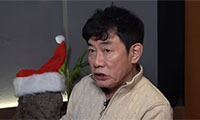Proud Iraqis Deal Uneasily With Their U.S. ‘Friends’
▶ Iraqis are in charge, but they still can’t fix their Humvees.
BAGHDAD - Iraqi military officials often refer to their American counterparts as “the friends,” a circumlocution full of Eastern subtlety that is often lost on the friends themselves. Add some more quotation marks, and it comes closer to the sense intended, “the ‘friends.’” Not sarcastic, exactly, but rather colored with mixed emotions, as in the sentence, “The ‘friends’ came by yesterday to complain again about payroll skimming.”
Americans find this hard to understand about the Iraq war, that their trillion-dollar enterprise has made Iraqis and particularly the Iraqi military not only dependent on America, but also conflicted, even resentful about that dependency. After all, we saved them from defeat at the hands of a ruthless insurgency that a few years ago indeed could have destroyed them, and we spent 4,000 lives doing it, left probably 10 times that many young Americans crippled for life, and they’re not grateful?
That is not, at bottom, how the Iraqis see it. They are grateful, many of them, but gratitude is a drink with a bitter aftertaste. They also chafe at the thousands of daily humiliations they endure from a mostly well-meaning but often clueless American military. An Iraqi politician who wishes to remain nameless (“I have to deal with the friends,” he explains) tells of traveling with the Iraqi Army’s chief of staff, a general in uniform, epaulets bristling with eagles, stars and swords. They were at the Baghdad airport, about to get on one of the few Iraqi military planes, when an American sergeant stopped him and refused to allow him to board. Despite the general’s remonstrations of rank and privilege, the sergeant made sure the plane took off without him.
This indirectly explains a lot about the current state of affairs, post June 30. Iraqis have enthusiastically embraced their newfound military sovereignty, even when, as is often the case, they’re not really ready for it. They can field troops who can fight, but they can’t fix their Humvees. They can mount their own operations against insurgents, but are reluctant to do so without air cover - which so far only the Americans can provide. They can marshal large numbers of soldiers - theirs are now more numerous than America’s in Iraq - but they depend on the Americans to handle most of their logistics, since their own are plagued by corruption and mismanagement.
Under the new Status of Forces Agreement between the countries, not only did American troops leave all population centers after June 30, but they’ve also agreed not to get involved, in or out of the cities, unless invited to do so by the Iraqis. And the Iraqi inclination has been not to invite them, partly out of pride, partly out of concern for the political blowback from their own public when they do ask for help.
This was brought into focus by the two ministry truck bombings on August 19, which succeeded because fortifications had been prematurely removed from in front of those ministries.
“It was Iraqi aspirations exceeding their ability to secure their country on their own,” says John Nagl, a retired Army lieutenant colonel and an author of influential works on counterinsurgency. “The Iraqi government and the Iraqi security forces are improving steadily but they’re not yet able to handle these threats responsibly”
Mr. Nagl argues that the Iraqi and American militaries need to set up prearrangements by which the United States can intervene in an emergency on the ground; such arrangements are entirely possible under the terms of the forces agreement, even if they may cause political difficulties, especially in an election year.
“The government of Iraq is going to have to ask us for our help, and it takes a while for the Iraqi government to process that,” he says. “The Iraqi government is not yet able to make a quick decision. This whole incident should serve as a wake-up call that the U.S. still has a very important role to play in Iraq’s security.”
At the highest levels, despite the bluster and the perennial ill-feeling, Iraqis know they will remain dependent on the United States for a very long time, even after the internal insurgency is vanquished.
Nationalism, though, can be a dangerous and deluding force. It has, writes the analyst Kenneth Pollack in the forthcoming issue of The National Interest, “led many Iraqi politicians, including the prime minister, to take public positions unsupportive of the American presence, even though most know that America’s role as peacekeeper, mediator, adviser and capacity-builder remain critical to Iraq’s stability and progress.”
There’s an old saying that if you save someone’s life, they become your responsibility forever. It seems counterintuitive, but those it happens to know how true it is. Having interfered so intimately in another person’s fate, or another nation’s fate, it becomes very hard just to turn away.
스마터리빙
more [ 건강]
[ 건강]이제 혈관 건강도 챙기자!
[현대해운]우리 눈에 보이지 않기 때문에 혈관 건강을 챙기는 것은 결코 쉽지 않은데요. 여러분은 혈관 건강을 유지하기 위해 어떤 노력을 하시나요?
 [ 건강]
[ 건강]내 몸이 건강해지는 과일궁합
 [ 라이프]
[ 라이프]벌레야 물럿거라! 천연 해충제 만들기
 [ 건강]
[ 건강]혈압 낮추는데 좋은 식품
[현대해운]혈관 건강은 주로 노화가 진행되면서 지켜야 할 문제라고 인식되어 왔습니다. 최근 생활 패턴과 식생활의 변화로 혈관의 노화 진행이 빨라지고
사람·사람들
more많이 본 기사
- 한인 식당서 이콜라이 집단 식중독
- 무면허 건축업자 ‘계약사기’ 집중 단속
- 내년 보험료 급등 우려 오바마케어 가입 감소
- 2025 한인사회 10대 뉴스
- 한인 교계 일제히 성탄 축하 특별예배
- ‘손흥민 vs 메시’
- 미성년자와 성관계 체조코치 체포
- “반갑다 상승 정체”… 11월 주택 판매량 3년래 최고
- “현대판 노예 같았다” J-1 비자 악용 속출
- 2025 미국·세계 10대 뉴스
- LAFC가 돌아본 2025년 최고의 순간 10장면
- 2026년 변경되는 소셜연금
- 초강력 폭풍우 피해 속출… 3명 사망
- 뼈 건강에 커피가 더 좋을까, 차가 더 좋을까?
- ‘긴급 렌트비 보조’ LA카운티 접수 시작
- [2025년 경제이슈 결산] ‘미 우선주의’ 트럼프 관세전쟁… 전 세계가 들썩였다
- ‘수술’ 네이마르, ·호날두… 2026 월드컵, 레전드들의 선택은?
- 농심, ‘신라면 분식’ 매장 글로벌 확장
- 의료비 상승과 건강플랜 대책
- ‘1위는 그레이스 김 메이저 역전 우승’
- 크리스마스 연휴… 오픈한 샤핑몰 ‘북적’
- 국채금리, 3분기 GDP 성장에 급등
- ‘LA 강’에 산책·자전거길 조성
- 한인 2세, 드라마 ‘런’ 주연 맡아
- 신규 실업수당 청구, 1만건 감소
- ‘18억불’ 잭팟 터졌다 파워볼 1등… 1
- [송년 행사] 코윈 퍼시픽 LA
- 정부효율부 출범에도 지출 더 늘어
- [전익환 프로의 골프교실] 좌우로 휘게하는 샷
- 레오 14세 교황, 첫 성탄 메시지… “전쟁 종식해야”
- [송년 행사] 사단법인 충효예
- [송년 행사] 마포중고
- 수백억 제작비 파격 선지급… 오겜·킹덤 메가 히트작 탄생
- 이민단속·산불 영향 LA카운티 인구 감소
- 엔비디아 200억달러 베팅… 구글 설계자·기술 빼돌려
- ‘챗GPT 답변 광고삽입’ 오픈AI, 대화형 광고
- 한국 맥주 소비량 세계 15위
- 내년 반도체 매출 성장 사상 첫 1조달러 돌파
- LG엔솔, 합작공장 건물 혼다에 매각
- 워너브러더스 인수 경쟁 ‘진행형’
- 3분기 불꽃 성장에도 양극화 ‘그늘’
- 웨이모, 또 운항 중단 20일 정전·25일 날씨로
- “미국 기업 표적 제재 말라”… 쿠팡, 서울·워싱턴 ‘난기류’
- [주말 뭐 볼까 OTT] 상실과 전쟁 속 가족의 초상, 다시 열린 ‘판도라’
- 새해 더 중요해지는 노동법 준수
- 연말연시, 안전하고 차분하게
- 실리콘밸리 월남참전전우회 송년모임
- “온 세상에 평화를”***트리로 변한 명동성당
- [한국춘추] 미국의 힘
- [캐슬린 파커 칼럼] 지미 라이의 마지막 희망
1/5지식톡

-
 미 육군 사관학교 West Poin…
0
미 육군 사관학교 West Poin…
0https://youtu.be/SxD8cEhNV6Q연락처:wpkapca@gmail.comJohn Choi: 714-716-6414West Point 합격증을 받으셨나요?미 육군사관학교 West Point 학부모 모…
-
 ☝️해외에서도 가능한 한국어 선생님…
0
☝️해외에서도 가능한 한국어 선생님…
0이 영상 하나면 충분합니다!♥️상담신청문의♥️☝️ 문의 폭주로 '선착순 상담'만 진행합니다.☎️ : 02-6213-9094✨카카오톡ID : @GOODEDU77 (@골뱅이 꼭 붙여주셔야합니다…
-
 테슬라 자동차 시트커버 장착
0
테슬라 자동차 시트커버 장착
0테슬라 시트커버, 사놓고 아직 못 씌우셨죠?장착이 생각보다 쉽지 않습니다.20년 경력 전문가에게 맡기세요 — 깔끔하고 딱 맞게 장착해드립니다!장착비용:앞좌석: $40뒷좌석: $60앞·뒷좌석 …
-
 식당용 부탄가스
0
식당용 부탄가스
0식당용 부탄가스 홀세일 합니다 로스앤젤레스 다운타운 픽업 가능 안녕 하세요?강아지 & 고양이 모든 애완동물 / 반려동물 식품 & 모든 애완동물/반려동물 관련 제품들 전문적으로 홀세일/취급하는 회사 입니다 100% …
-
 ACSL 국제 컴퓨터 과학 대회, …
0
ACSL 국제 컴퓨터 과학 대회, …
0웹사이트 : www.eduspot.co.kr 카카오톡 상담하기 : https://pf.kakao.com/_BEQWxb블로그 : https://blog.naver.com/eduspotmain안녕하세요, 에듀스팟입니다…
케이타운 1번가
오피니언

새해 더 중요해지는 노동법 준수

연말연시, 안전하고 차분하게
 캐슬린 파커 워싱턴포스트 칼럼니스트
캐슬린 파커 워싱턴포스트 칼럼니스트 [캐슬린 파커 칼럼] 지미 라이의 마지막 희망
 유경재 나성북부교회 담임목사
유경재 나성북부교회 담임목사 [한국춘추] 미국의 힘
 전병두 서북미수필가협회 회원
전병두 서북미수필가협회 회원 [금요단상] 비자 발급
 박일근 / 한국일보 수석논설위원
박일근 / 한국일보 수석논설위원 [지평선] 스님의 주례사
 신상철 / 고려대 고고미술사학과 교수
신상철 / 고려대 고고미술사학과 교수 [미술 다시보기] 신의 모습을 닮고자 한 예술가
 스티브 강 전 한인민주당협회 회장
스티브 강 전 한인민주당협회 회장 [스티브 강 ‘인사이드 미국’] 2026 중간선거: 트럼프 지지율 하락이 말해주는 것
 김홍일 케이유니콘인베스트먼트 대표
김홍일 케이유니콘인베스트먼트 대표 [기고] 안정의 기준은 어떻게 제도가 되었나
1/3지사별 뉴스

“온 세상에 평화를⋯”
숨가쁘게 달려온 2025년을 이제 1주일 남짓 남긴 채 크리스마스 이브를 맞는다. 다사다난했던 한 해를 되돌아보며 마무리하는 연말 시즌과 크리…
H-1B비자 고임금·경력자에 우선권

“한반도 평화정착에 앞장선다”
민주평화통일자문회의 미주지역회의(부의장 이재수)는 22일 기자회견을 통해 내년도 활동 방향과 목표를 밝혔다. 이재수 부의장은 “미주지역회의는…
VA 페어팩스 카운티 실업자 급증

한인들 위한 무료 법률 상담회 개최
샌프란시스코 베이지역 한인회(회장 김한일)는 지난 20일 한인회관에서 북가주 지역 한인들을 위한 무료 법률 상담회를 개최했다. 이날 행사에는 …
여성 살해·자녀 납치 한인 ‘수배’

오늘 하루 이 창 열지 않음 닫기 























































.png)


댓글 안에 당신의 성숙함도 담아 주세요.
'오늘의 한마디'는 기사에 대하여 자신의 생각을 말하고 남의 생각을 들으며 서로 다양한 의견을 나누는 공간입니다. 그러나 간혹 불건전한 내용을 올리시는 분들이 계셔서 건전한 인터넷문화 정착을 위해 아래와 같은 운영원칙을 적용합니다.
자체 모니터링을 통해 아래에 해당하는 내용이 포함된 댓글이 발견되면 예고없이 삭제 조치를 하겠습니다.
불건전한 댓글을 올리거나, 이름에 비속어 및 상대방의 불쾌감을 주는 단어를 사용, 유명인 또는 특정 일반인을 사칭하는 경우 이용에 대한 차단 제재를 받을 수 있습니다. 차단될 경우, 일주일간 댓글을 달수 없게 됩니다.
명예훼손, 개인정보 유출, 욕설 등 법률에 위반되는 댓글은 관계 법령에 의거 민형사상 처벌을 받을 수 있으니 이용에 주의를 부탁드립니다.
Close
x